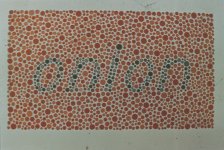Reading a very interesting article in the morning paper about a WWII Veteran who was turned away by the Navy because of being color blind and being taken by the US Army Air Corps because they believed he would be able to detect camouflage better from the air and they wanted him. He served as a Gunner on a Flying Fortress.
This story also goes on to tell of his many years as a School Buss Driver
http://www.duluthnewstribune.com/event/article/id/256448/
We survey all of our Firearms Safety Students for Color Blindness and although I have a hard time remembering more than 3-4 in over 25 year of showing the slide with The word ONION in the circle, and I could not find my slide on-line, but the thing is when talking about how they have to be so much more careful because of their condition I alway regroup at that point and stress that we all have the obligation of being just as careful wether or not we are color blind.
My FIL was also color blind and a deer in tall grass was invisible to him, he was always looking for the white spots to help him but could only see the head many times.
This story also goes on to tell of his many years as a School Buss Driver
http://www.duluthnewstribune.com/event/article/id/256448/
We survey all of our Firearms Safety Students for Color Blindness and although I have a hard time remembering more than 3-4 in over 25 year of showing the slide with The word ONION in the circle, and I could not find my slide on-line, but the thing is when talking about how they have to be so much more careful because of their condition I alway regroup at that point and stress that we all have the obligation of being just as careful wether or not we are color blind.
My FIL was also color blind and a deer in tall grass was invisible to him, he was always looking for the white spots to help him but could only see the head many times.



